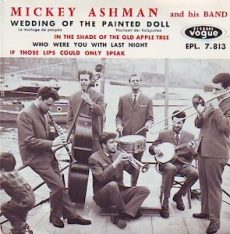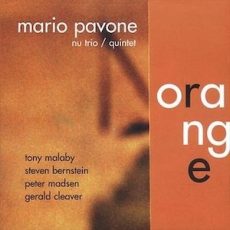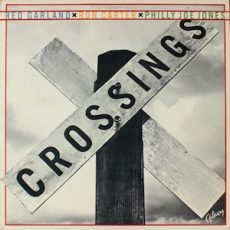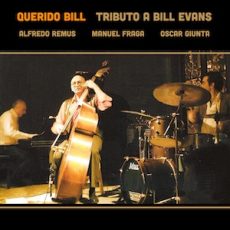
Daily Dose Of Jazz…
Mickey Ashman was born on November 12, 1927 in the United Kingdom and began playing the double bass at a young age. His sojourn into the jazz world began in the early 1950s when he collaborated with Chirs Barber in one of his amateur bands. Their early 1951 recording Misty Morning hinted at his exceptional musical talent.
The mid-Fiftiess saw his transition into the professional realm of jazz, joining Humphrey Lyttelton’s band. In 1956, he returned to Chris Barber’s Jazz Band, further solidifying his reputation as a sought-after bassist. Mickey made significant contributions to two influential LP records, Echoes Of Harlem and Volume 2 in the Chris Barber Plays series.
Parting ways with Chris Barber’s band following Lonnie Donegan’s exit in 1956, he joined Lonnie in creating one of the UK’s most popular musical acts in the late 1950s. By the early 1960s, he embraced leadership, forming Micky Ashman’s Ragtime Jazzmen. Although the group didn’t achieve the same level of fame as some of its contemporaries, they contributed noteworthy recordings like Tin Roof Blues.
His dedication to jazz and versatile talent solidified his place in British jazz history and his legacy continues to inspire musicians. Double bassist Mickey Ashman, also known as Micky, died on August 21, 2015.
More Posts: bandleader,bass,history,instrumental,jazz,music

Daily Dose Of Jazz…
Mario Pavone was born on November 11, 1940 in Waterbury, Connecticut and attended B. W. Tinker grammar school, Leavenworth High School, and the University of Connecticut at Storrs, where he graduated with a B.S. in engineering. When his neighbor, guitarist Joe Diorio, recognized him as an unrealized musician Mario was inspired to take up the bass. Primarily self-taught, he was a natural on his instrument. Pavone began playing bass soon after witnessing John Coltrane at the Village Vanguard in 1961.
Pavone’s career took off during the Sixties when he toured Europe and was involved in the jazz loft era, playing in jam sessions nightly in New York City. From the late in the decade into the early Seventies he was a member of Paul Bley’s trio. The New Haven based Creative Musicians Improvising Forum (CMIF) was founded in 1975 by Pavone, Wadada Leo Smith, and Gerry Hemingway was influenced by Chicago’s Association for the Advancement of Creative Musicians. His venture into composition began here.
In 1979 Mario recorded his debut album as a leader and was a member of Bill Dixon’s trio during the 1980s. He also performed with Barry Altschul, Smith, and Hemingway. In 1980 he began an 18-year musical relationship with saxophonist Thomas Chapin. With drummer Michael Sarin, the group recorded seven albums for Knitting Factory Records, which also released an eight-CD box set of these albums plus a live recording following Chapin’s death in 1998.
He co-led a group with Anthony Braxton in the early 1990s, with Braxton on piano rather than his usual saxophones. His groups have included Matt Wilson, Gerald Cleaver, Peter Madsen, Joshua Redman, Tony Malaby, Dave Douglas, Steven Bernstein, George Schuller, Craig Taborn, and Jimmy Greene.
Bassist Mario Pavone, who has over 40 recordings and several films documenting his compositions and performances, died from carcinoid cancer in Madeira Beach, Florida on May 15, 2021 at the age of 80.
More Posts: bandleader,bass,composer,history,instrumental,jazz,music

Requisites
Crossings ~ Red Garland, Ron Carter and Philly Joe Jones | By Eddie Carter
It happened like this: after hearing Introducing Carl Perkins, I spent the remainder of the evening listening to several other trio albums while reading when I heard a title I hadn’t played in a while, which inspired this morning’s discussion. Crossings (Galaxy GXY-5106) is a 1978 release bringing together a dream team to record their first trio album. Red Garland is on piano, Ron Carter is on bass, and Philly Joe Jones is on drums. All three were members of the Miles Davis Quintet and have given jazz fans many incredible albums throughout their careers as leaders and sidemen. My copy is the original U.S. Stereo release.
Side One starts with a brief trio introduction, setting the stage for the melody of Solar by Chuck Wayne and Miles Davis. Red leads the way with a statement that sparkles with energy. Ron delivers precisely articulated choruses in the second solo. The pianist and Philly share the finale in an inspired interpretation, leading to the theme’s reprise. Railroad Crossing by Ron Carter is a smooth, easy-flowing tune. The bassist sets the tone with a concise introduction that seamlessly transitions to the trio’s melody. Carter begins with a leisurely opening statement; then, Garland gets into a down-home groove on the following solo ahead of the bassist’s return for the ending theme.
Never Let Me Go is a beautiful Jay Livingston and Ray Evans song. It was featured in the 1956 film noir The Scarlet Hour. Red opens with a short unaccompanied introduction that segues into the trio’s gorgeous theme. The pianist goes first with a delicately sultry performance, then hands the torch to Ron, who delivers a heart-warming presentation before the close. Oleo by Sonny Rollins gets underway with a short workout by Jones, leading to the ensemble’s quick theme. Garland ignites the fire in the first solo, and then Carter keeps the fires burning next. Jones adds more heat in the closer, preceding a captivating conclusion.
George and Ira Gershwin introduced But Not For Me in the 1930 Broadway musical Girl Crazy. The jazz standard starts Side Two with Ron leading the trio through the melody. The bassist masterfully manages the opening statement before making room for Red, who swings in the following reading. Ron returns to converse briefly with Philly ahead of the finish. Cole Porter’s classic Love For Sale begins with a lengthy solo piano introduction before the trio steps on the gas for the lively theme. Garland ignites the first solo with fiery choruses. Carter steps into the spotlight next and slows things down, and Garland returns for a vigorous exchange with Jones into the climax.
Orrin Keepnews produced Crossings, and Bruce Walford recorded and mixed the album at Fantasy Studios. David Turner mastered the album. The record’s sound quality possesses a vibrant soundstage, placing the musicians in your listening room with excellent fidelity. If you’re a fan of these jazz giants and enjoy a good piano trio album, I invite you to check out Crossings by Red Garland, Ron Carter, and Philly Joe Jones. The group’s musicianship shows three masters’ at work, and the six selections complement each other perfectly. The result is an album you can sit back, listen to and enjoy from the first note to the finale!
~ But Not For Me, Love For Sale, Oleo – Source: JazzStandards.com
~ Solar – Source: Wikipedia.org
© 2024 by Edward Thomas Carter
More Posts: bass,choice,classic,collectible,collector,drums,history,instrumental,jazz,music

Daily Dose Of Jazz…
Gustavo Casenave was born on November 10, 1971 in Montevideo, Uruguay where he studied classical piano from age 6 with Maestro Hector Tosar, who was Aaron Copland’s student. He led the group Kongo Bongo and recorded two albums, however, following a conversation with Hugo Fattoruso he decided to study in Boston, Massachusetts. In 1994 received a full scholarship from O.A.S. to study at the Berklee College of Music and two years later he graduated magna cum laude.
During this period he was awarded the Professional Music Achievement, and his composition Fragiltimer for the Past Future for piano was selected as one of the ten best original compositions coming out of Berklee in the last 30 years, 1966-1996. In 1995 he was accepted as a private student by the legendary jazz vibraphonist Gary Burton.
1997 saw Gustavo settling in New York City and creating a name for himself. He has been awarded three Grammys as a producer, composer and performer, Best Latin Jazz Album (producer), Best Tango Album, and Best Instrumental Album that showcased his ability to create compositions that resonate with audiences worldwide. He has also had six Latin Grammy nominations and three nods for Best Contemporary Classical Composition.
As an educator, Casenave has held positions as Jazz Department Director at the Harbor Conservatory for the Performing Arts and has conducted Tango Master Classes as well as being a guest artist lecturer at The Juilliard School, Yale University, Eastman School of Music, Oberlin Conservatory and Indiana University.
Pianist Gustavo Casenave continues to contribute to jazz as a performer, composer, educator, and scholar, having published his first music theory book, “The Harmonic Structure Levels.
More Posts: bandleader,composer,educator,history,instrumental,jazz,music,scholar

Daily Dose Of Jazz…
Alfredo Remus was born in Buenos Aires, Argentina on November 9, 1938. In 1964 he participated as the double bassist on the historic album La Misa Criolla by Ariel Ramírez.
He has accompanied important musicians and groups such as Paul Gonsalves, Vinícius de Moraes, Maria Bethânia, Enrique “Mono” Villegas, Gato Barbieri, Mercedes Sosa, Tony Bennett, Ariel Ramírez, Víctor Heredia, Alberto Cortez, Trio Los Panchos, Raphael, Zupay Quartet, Dyango, Leonardo Favio, Sandro, Susana Rinaldi, and Antonio Carlos Jobim , among others.
He was a regular participant in a series of informal folklore improvisation and experimentation meetings at Eduardo Lagos’s house, humorously baptized by Hugo Díaz as folkloréishons, which in the style of jazz jam sessions, used to bring together Lagos, Astor Piazzolla and Díaz.
With other musicians, Remus played with Oscar Cardozo Ocampo, Domingo Cura and Oscar López Ruiz among others. He recorded nine albums as a leader with his debut album Trauma released in 1968 and his final recording Tribute To Bill Evans in 2006.
Double bassist Alfredo Remus, who performed various genres of American popular music, that included but not limited to tango, jazz, Argentine folklore, bossa nova and post-bop, died in Buenos Aires on September 28, 2022.
More Posts: bandleader,bass,history,instrumental,jazz,music


